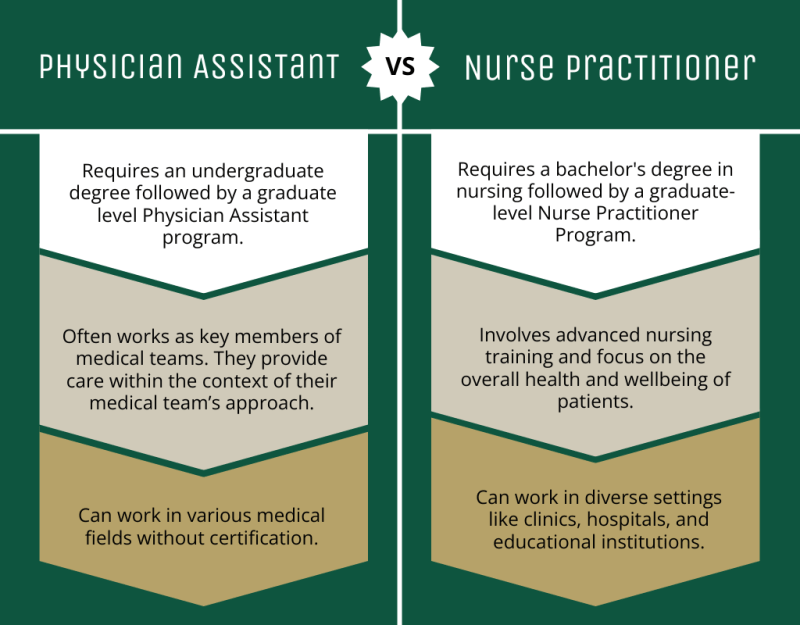
If you are someone interested in becoming a healthcare professional, it can be difficult to decide which area to go into. Perhaps you are seeking an alternative to becoming a physician but still have a desire to provide medical care to patients.
In the dynamic field of healthcare, physician assistants (PAs) and nurse practitioners (NPs) play pivotal roles in providing comprehensive patient care in the highest levels of nursing practice. Both professions blend clinical expertise with a dedication to improving health outcomes, yet they each bring distinct perspectives and skill sets to patient care.
Understanding the differences between these two unique professions can help you decide which career option to pursue.
What is a Physician Assistant?
According to the American Academy of Physician Associates (AAPA), physician assistants (PAs) are clinicians who practice medicine and provide patient care under the supervision of physicians. They collaborate with doctors, surgeons, and healthcare workers to examine patients and deliver care. According to AAPA, the profession is consistently ranked among the top 5 healthcare, STEM and overall jobs in the U.S.
PAs perform a variety of medical tasks to help and assist patients. They conduct physical examinations, treat and diagnose patients, order tests and interpret them, prescribe medication and offer medical advice.
In the same way that medical doctors can choose their specialty, PAs can also choose a particular area of medicine to specialize in. These areas include primary care and family medicine, psychiatry, and emergency medicine. The workload, responsibilities and how closely they work with patients depends on the specialty they choose.
The AAPA states that candidates to physician assistant master’s degrees must complete 2,000 hours of clinical rotations and pass a certification exam among other prerequisites.
What is a Nurse Practitioner?
Nurse practitioners (NPs) are highly skilled clinicians who diagnose and treat medical conditions and illnesses. According to the American Association of Nurse Practitioners (AANP) NPs use their clinical expertise to diagnose and treat health conditions, focusing on disease prevention and health management.
Nurse practitioners can work in various areas as primary providers, including psychiatric health, pediatrics, family, women’s health, among others.
NPs typically enter into the field by completing a registered nurse (RN) preparation and adding to that a master’s or doctoral degree program as well as advanced clinical training beyond their initial RN license. These advanced courses equip them with specialized knowledge and clinical skills for practice in their areas of choice.
The AANP states that in addition to providing high-quality healthcare, NPs typically achieve national certification, undergo periodic peer reviews and clinical outcome evaluations and adhere to a strong code of ethical practice. They also conduct research and apply those findings to their practice, delivering care in clinics, emergency rooms, hospitals, urgent care centers, nursing homes, schools, colleges and public health departments.
______
Who are you called to be?
Pursue your purpose at PLNU.
______
Key Differences between a Nurse Practitioner and a Physician Assistant
There are a myriad of differences between NPs and PAs but the one thing that they have in common is that they have similar qualifications and duties to primary care physicians. They have the expertise to diagnose and prescribe treatments for patients in ways that go beyond other nursing positions. However, there are some important differences between the two fields.
The first main difference is in the level of autonomy allowed for each field. Depending on the state in which they practice, PAs must work under the supervision of a physician, while NPs can provide care independently.
Here are some additional differences.
Education and Training
Both NPs and PAs require graduate degrees but the training for each may differ.
Nurse Practitioners first earn a bachelor’s degree in nursing, followed by a graduate-level nurse practitioner program or Master of Science in Nursing (MSN), with an NP or similar concentration . These programs are often competitive and require a minimum of five years of RN experience. NPs must also pass a national certification exam and obtain both an RN and state APRN license. Some NPs pursue further education, such as a Doctor of Nursing Practice or a Ph.D.
Physician Assistants complete an undergraduate degree in two to four years followed by a master’s degree from an accredited program. They also must pass the Physician Assistant National Certifying Examination (PANCE), and become licensed as a PA-C.
Roles and Responsibilities
Many of the duties between PAs and NPs overlap. Both are able to diagnose and treat patients, order and interpret diagnostic tests, prescribe medication, and manage overall patient care.
Despite these similarities, their approaches may differ given their work environment and the training.
Nurse Practitioners receive advanced nursing training and take a holistic approach, focusing on overall health and well-being. This encompasses preventive work and patient education.
Physician Assistants often work as key members of medical teams. As such their training is based on medical school principles, qualifying them to practice medicine. Rather than simply focusing on the overall health of the patient, they provide care within the context of the approach their medical team takes for each patient.
NPs are also trained in the medical model, however, their focus on holistic care and prevention differs from the standard medical model of strictly diagnosing and treating diseases.
Work Environment
PAs graduate as generalists and can work in various medical fields without re-certification. They can choose to specialize through post-graduate residency or through on-the-job training.
NPs specialize in specific health concerns and areas and can work in diverse settings like physician’s offices, clinics, hospitals, and educational institutions. Many states allow NPs to practice independently without physician supervision.
Physician Assistant Career Outlook
According to the U.S. Bureau of Labor Statistics, employment for physician assistants is expected to grow by 27 percent until 2032, significantly faster than the average for all occupations.
In the next decade, there will be about 12,200 job openings, many of them stemming from the need to replace workers who switch to other occupations or leave the workforce through retirement.
The average annual salary for PAs was $130,020 in May 2023.
Nurse Practitioner Career Outlook
Employment for nurse practitioners is expected to rise by 38 percent until 2032, surpassing the average growth rate for all occupations. There will be 29,200 job openings each year for the profession throughout the decade. The average annual salary for NPs was $129,480 in May 2023.
Given that the United States has been facing a shortage of primary care providers recently, it follows that these positions will be in high demand in the future. This makes them a safe bet for job security and employment prospects.
PA vs. NP Career Overview
| Position | Average Salary | Growth Rate | Required Degree | Average Program Duration |
| Physician Assistant | $130,020 | 27% | Master's Degree | 28 months |
| Nurse Practitioner | $129,480 | 38% | Master's Degree | 2 years |

Take the next step in your education
As the demands for healthcare professionals continue to rise, exploring a career as a Physician Assistant or Nurse Practitioner presents a promising path for those interested in entering the medical or nursing field. Both roles provide opportunities to provide essential medical care for patients.
Taking the next step in your education opens doors to entrance into these dynamic careers.
PLNU’s Physician Assistant M.S.M program is the ideal starting point for anyone looking to pursue a career as a PA. The program blends service experiences into the curriculum throughout both the didactic and clinical phases, including a dedicated month each year allowing domestic, national, or international medical exposures through the extensive networks and local connections in Southern California.
To pursue a degree as a Nurse Practitioner, PLNU offers you several options including completing your minimal Bachelor of Science in Nursing, a post-graduate certification as a family nurse practitioner or a Doctor of Nursing Practice, Family Nurse Practitioner.